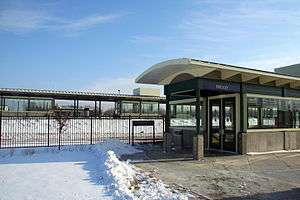Fridley (Metro Transit station)
Fridley | ||||||||||||
|---|---|---|---|---|---|---|---|---|---|---|---|---|
 Fridley station with the west tunnel entrance in the foreground. | ||||||||||||
| Location |
61st Way & East River Road NE (west lot) 61st Ave & Main Street NE (east lot) Fridley, MN 55432 | |||||||||||
| Coordinates | 45°4′43.5″N 93°16′15.7″W / 45.078750°N 93.271028°WCoordinates: 45°4′43.5″N 93°16′15.7″W / 45.078750°N 93.271028°W | |||||||||||
| Line(s) | ||||||||||||
| Platforms | Island platform (only one side in use) | |||||||||||
| Tracks | multiple (only 1 usable) | |||||||||||
| Connections | 824, 852 | |||||||||||
| Construction | ||||||||||||
| Parking | 611 spaces | |||||||||||
| Disabled access | Yes | |||||||||||
| History | ||||||||||||
| Opened | November 16, 2009 | |||||||||||
| Services | ||||||||||||
| ||||||||||||
Fridley Station is a commuter rail station in Fridley, Minnesota, located at Main Street NE and 61st Avenue NE. It is served by the Northstar Commuter Rail line. The station features bicycle lockers and two park and ride lots with a total capacity of 611 spaces. The commute time to downtown Minneapolis from this station is about 20 minutes.[1] The fare from this station to any station on the line is $3.00 on weekdays and $2.50 on weekends and holidays.[2][3] The station has a single platform on one main track, which is accessible on either side of the tracks through an underground tunnel.
History
The doubled tracked main line for the BNSF Railway transcontinental railroad travels through Fridley after leaving Minneapolis. It runs parallel to the Mississippi River. The former Northern Pacific Railway and Great Northern Railway parallel main lines form this double track main. Fridley had been served by a flag stop station at Mississippi Boulevard between East River Road and University Avenue. The Minneapolis, Anoka and Cuyuna Range Railway, whose tracks ran along East River Road also had a station at Mississippi Boulevard.
With the elimination of commuter service to Anoka, Fridley had not been served by commuter rail. Metro Transit buses extend through Fridley.
The Fridley Station was planned as part of the Northstar Commuter rail project. The cost of construction was $9.9 million. The station was eliminated to save money because of a federal funding shortage. In late October 2008, the Counties Transit Improvement Board, which oversees spending of the new quarter-cent transit sales tax approved this year by the Minnesota state Legislature and five Twin Cities metro-area counties, decided to make the Fridley project one of its first funding priorities.[4]
The connecting underground tunnel was completed by BNSF Railway crews over the Memorial Day weekend in May 2008 because the City of Fridley committed money to the project and spent $3.2 million to acquire 10 acres (40,000 m2) for parking.[4]
Third main line
The Fridley station is at the westbound yard limit of the BNSF Railway Northtown classification yard. There are multiple rail sidings in the area on both sides of the double track main line. The current station has only one side of the platform in use, requiring the Northstar train to be on that track when traveling inbound to or outbound from Minneapolis. Trains cross to and from that track at Coon Creek Junction. The eventual plan is that BNSF will construct a third main line in the area, running from East Interstate (the bridge over Interstate 694) to Coon Creek Junction in Coon Rapids.[5] This is a Transportation Investments Generating Economic Recovery (TIGER) grant application submitted to the American Recovery and Reinvestment Act. The third main line would improve capacity on the busiest rail corridor in the Twin Cities metropolitan area.[5][6] In July 2009, this segment hosted 63 trains per day, before the 12 daily trips for Northstar are added. At Coon Creek Junction, 12 trains per day cut off to the Duluth line. The completion of the third main line will include construction of the Foley Boulevard station and allow for 22 more passenger trains per day for Northstar, the proposed Northern Lights Express, Amtrak, and possibly other services.[5]
Notes
- ↑ http://www.metrotransit.org/fridley-station.aspx
- ↑ http://www.metrotransit.org/fares.aspx#Northstarfares
- ↑ http://metrotransit.org/TransitArticles/Story.aspx?pageid=18&mid=393&articleid=994
- 1 2 Adams, Jim - Fridley's plans for Northstar station are on fast track. Star Tribune, November 29, 2008
- 1 2 3 BNSF Easement Rights and Passenger Rail Capacity Improvements. Minnesota Department of Transportation, September 15, 2009
- ↑ Minneapolis-St. Paul Metro Area 2009 Railroad Volume and Speed Map. Minnesota Department of Transportation, July 2009